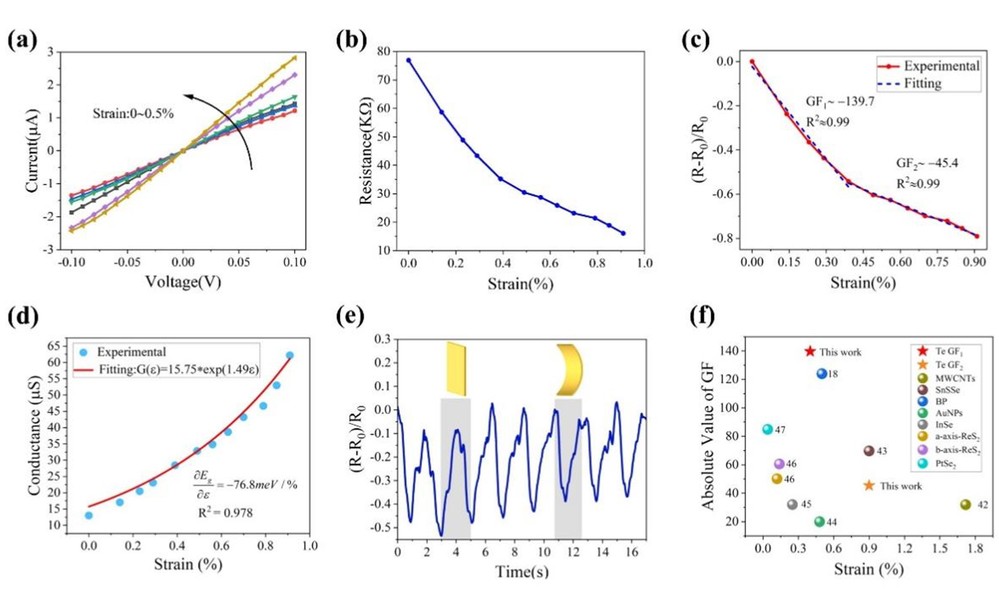On June 13, Dr. Cong Wang led Jiarui He, an undergraduate student majoring in electronic science and technology in 2023 to publish a research paper entitled “Highly sensitive flexible strain sensor based on the two-dimensional semiconductor tellurium with a negative gauge factor” in Science China Information Sciences, which is a renowned journal in the field of information science and technology. The Te-based strain sensor designed in this work achieved an impressive maximum sensitivity of −139.7 within a small range of bending-induced strain (< 1%) and a good cyclic stability, which has been successfully applied to monitor limb movements.
Research on flexible strain sensors has advanced rapidly in recent years, with particular attention being devoted to two-dimensional (2D) semiconductor materials owing to their exceptional mechanical and electrical properties that are conducive to sophisticated sensing performance. However, resistive strain sensors based on 2D semiconductor materials typically exhibit positive gauge factors (GF), while materials for strain sensors with a negative GF remain elusive. Moreover, the relevant values are generally small even if a negative GF is obtained. Therefore, the exploration of strain sensors based on 2D semiconductors with a significantly negative GF has emerged as an important scientific problem in the field of 2D semiconductor-based strain sensors in recent years.
This study combined Te with a flexible polyethylene terephthalate (PET) substrate to manufacture a flexible strain sensor with a significantly negative GF. Through Raman tests and first-principles calculations, the band gap and resistance of Te decreased under strain, reflecting the characteristics of a sensor with a negative GF. Within the range of bending strain of 0%–0.9%, the maximum absolute value of its measured GF was as high as 139.7. The results of comparisons with other sensors showed that it has a higher sensitivity of detection under small bending strains. Moreover, the proposed sensor demonstrated excellent repeatability (Figure 1). This study also applied it to monitor limb movement as well as for gesture recognition and motion tracking. This work verifies the significant potential for the use of Te-based strain sensors in next-generation flexible electronics.

Figure 1. The sensitivity and repeatability of detection under small bending strains.
Dr. Cong Wang from the School of Mathematics and Physics of Beijing University of Chemical Technology and Associate Professor Tian He from the School of Integrated Circuits of Tsinghua University are the co-corresponding authors. Jiarui He, a graduate of Beijing University of Chemical Technology in 2023 is the first author of the paper. This work was supported by National Natural Science Foundation of China, Fundamental Research Funds for the Central Universities, and R&D Program of Beijing Municipal Education Commission.
Dr. Cong Wang, Associate Professor, Department of Physics, College of Mathematics and Physics, Dr. Cong Wang has carried out in-depth basic and applied basic research in the new micro-nano machining manufacturing technology based on laser direct writing, exploring new micro-nano effects induced by new micro-nano machining technology and the construction of new micro-nano devices. He has published 31 papers including Nature Communications, National Science Review (NSR), Matter, Advanced Materials, Nano Letters, Applied Physics Letters and other journals as first author (including co-first author) and co-corresponding author, and applied for two patents (one was approved).
Paper link: https://link.springer.com/article/10.1007/s11432-023-3938-y
